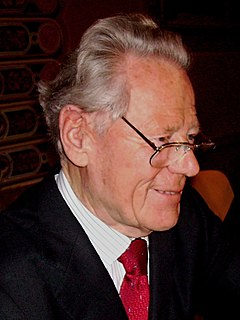A Quote by Robert Jeffress
Various religions offer a variety of theories about life, death, and eternity. And yet, as different as all religions are, they share one common characteristic: they teach that the way to be reconciled to God is through works and rituals.
Related Quotes
All religions are not the same. All religions do not point to God. All religions do not say that all religions are the same. At the heart of every religion is an uncompromising commitment to a particular way of defining who God is or is not and accordingly, of defining life's purpose.
Anyone who claims that all religions are the same betrays not only an ignorance of all religions but also a caricatured view of even the best-known ones. Every religion at its core is exclusive.
An important advance in the life of a people is the transformation of the religion of fear into the moral religion. But one must avoid the prejudice that regards the religions of primitive peoples as pure fear religions and those of the civilized races as pure moral religions. All are mixed forms, though the moral element predominates in the higher levels of social life. Common to all these types is the anthropomorphic character of the idea of God.
The one eternal religion is applied to the opinions of various minds and various races. There never was my religion or yours, my national religion or your national religion; there never existed many religions, there is only the one. One infinite religion existed all through eternity and will ever exist, and this religion is expressing itself in various countries in various ways.
This is why God created so many different religions: to be training grounds to make a path for every people, culture, custom, and tradition. Religions polish people to be qualified to enter the region of the original homeland. Because of humankind's many different cultural backgrounds, God sought and set the standard of comparison and has been leading the way toward one unified religious world.
The way of presentation is different according to each religion. In theistic religions like Buddhism, Buddhist values are incorporated. In nontheistic religions, like some types of ancient Indian thought, the law of karma applies. If you do something good, you get a good result. Now, what we need is a way to educate nonbelievers. These nonbelievers may be critical of all religions, but they should be decent at heart.
Before Christianity became the Roman Empire's official religion in the 4th Century, 'mystery religions,' organized around a central canon of secret knowledge, were widespread. Membership in such religions was limited to people who had passed through secret initiation rituals and had begun to learn a body of hidden knowledge.
We repeat and again reaffirm that neither a State nor the Federal Government can constitutionally force a person "to profess a belief or disbelief in any religion." Neither can constitutionally pass laws or impose requirements which aid all religions as against nonbelievers, and neither can aid those religions based on a belief in the existence of God as against those religions founded on different beliefs.
The recurring theme of all religions is a sympathy, empathy, connection, capacity between the human and the divine - that we were made for union with one another. They might express this through different rituals, doctrines, dogmas, or beliefs, but at the higher levels they're talking about the same goal. And the goal is always union with the divine.





































